Held Hostage in Iran: American Hiker Sarah Shourd's First Interview
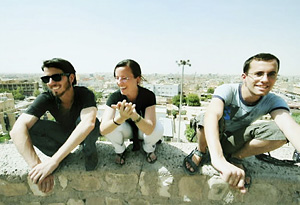
On July 31, 2009, three American hikers left their hotel in northern Iraq for a vacation trek through the mountains. Somewhere along the Iran-Iraq border, Sarah Shourd, her boyfriend, Shane Bauer, and their friend Josh Fattal strayed off course. Suddenly, the three friends were surrounded by Iranian soldiers who accused them of illegally crossing into Iran. They were arrested on the spot, thrown into prison and declared American spies.
Back in the States, the hikers' families waited in anguish. Weeks passed by without a word from Sarah, Shane or Josh.
In March 2010, seven months into the ordeal, Sarah was able to call home and let her family know she was alive. Two months later, Iran agreed to let the hikers have a brief reunion with their mothers. It was during this visit that Sarah's mother first learned that Sarah spent 23 hours a day in solitary confinement.
Then, in August 2010, Sarah was allowed to call home for a second time. It was with alarming news: She had a lump in her breast. Iranian leaders allowed Sarah to leave the country for treatment for the heavy price of $500,000. After nearly 14 months in prison, Sarah boarded a flight to Oman, where she had an emotional reunion with her mother.
Back in the States, the hikers' families waited in anguish. Weeks passed by without a word from Sarah, Shane or Josh.
In March 2010, seven months into the ordeal, Sarah was able to call home and let her family know she was alive. Two months later, Iran agreed to let the hikers have a brief reunion with their mothers. It was during this visit that Sarah's mother first learned that Sarah spent 23 hours a day in solitary confinement.
Then, in August 2010, Sarah was allowed to call home for a second time. It was with alarming news: She had a lump in her breast. Iranian leaders allowed Sarah to leave the country for treatment for the heavy price of $500,000. After nearly 14 months in prison, Sarah boarded a flight to Oman, where she had an emotional reunion with her mother.
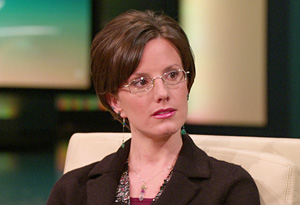
Now back in the United States, Sarah says she still doesn't feel completely free because she never expected to go home without Shane and Josh. She says she draws strength from her determination to do the right thing.
"I just need to keep up with my pleas to the Iranian government and the religious leaders to show the same humanitarian gesture, the same compassion, for my friends," Sarah says, "Because they don't deserve to be there one minute longer than I do. They committed no crime."
Sarah says the Iranian judge told her that she was released on bail because she was in solitary confinement, which is a more difficult sentence, and also because she is a woman.
"I just need to keep up with my pleas to the Iranian government and the religious leaders to show the same humanitarian gesture, the same compassion, for my friends," Sarah says, "Because they don't deserve to be there one minute longer than I do. They committed no crime."
Sarah says the Iranian judge told her that she was released on bail because she was in solitary confinement, which is a more difficult sentence, and also because she is a woman.
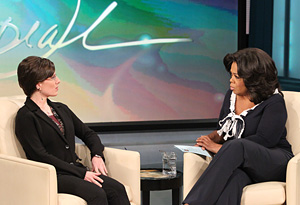
Many people might be wondering what Sarah, Shane and Josh were doing hiking in northern Iraq in the first place. Sarah says it's actually a popular vacation spot for people from all over the world and is known as being a lot safer than the rest of Iraq. Plus, they were familiar with the Middle East—Sarah and Shane had lived in Syria for a year, where Sarah worked as a teacher.
The night before they were captured, the three friends were at a wedding in Damascus. The next morning, they set out for a tourist site called Ahmad Awah, a popular camp site for Kurdish families. After a night of camping out, Sarah, Shane and Josh stopped at a small food stand and asked for a recommendation on where to go hiking. They were directed to a trail, and about three hours later, they saw the soldiers.
"We had no idea that we were even near Iran," Sarah says. "There is absolutely no indication of a border. No signs. We didn't see a single person. No flag or building or a fence—the way you would imagine a border. We were just on a trail, and so I have no way of knowing where that border is."
The night before they were captured, the three friends were at a wedding in Damascus. The next morning, they set out for a tourist site called Ahmad Awah, a popular camp site for Kurdish families. After a night of camping out, Sarah, Shane and Josh stopped at a small food stand and asked for a recommendation on where to go hiking. They were directed to a trail, and about three hours later, they saw the soldiers.
"We had no idea that we were even near Iran," Sarah says. "There is absolutely no indication of a border. No signs. We didn't see a single person. No flag or building or a fence—the way you would imagine a border. We were just on a trail, and so I have no way of knowing where that border is."
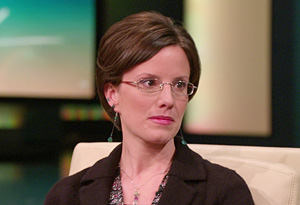
Before they were taken into prison, Sarah, Shane and Josh were driven around Iran and interrogated for a couple days.
"We switched hands several times, and we spent the night in a small prison—kind of in the middle of nowhere," Sarah says. "The first three days we just thought: 'This is impossible. We did nothing. We're tourists...they're going to let us go.'"
Reality didn't set in for Sarah until they arrived at the prison in Tehran, where they were separated for the first time.
"That was one of the most devastating moments because they just tore us apart and threw us into three different cells," Sarah says. "I screamed and screamed all night long, and that was when it hit me that we were in prison."
Eventually, Sarah, Shane and Josh were charged with espionage—an accusation that Sarah says is extremely painful.
"In the beginning, they told us again and again for the first six months, 'You're not being charged with espionage,'" Sarah says. "And I believed it. The first time I saw it on the television, I was devastated."
"We switched hands several times, and we spent the night in a small prison—kind of in the middle of nowhere," Sarah says. "The first three days we just thought: 'This is impossible. We did nothing. We're tourists...they're going to let us go.'"
Reality didn't set in for Sarah until they arrived at the prison in Tehran, where they were separated for the first time.
"That was one of the most devastating moments because they just tore us apart and threw us into three different cells," Sarah says. "I screamed and screamed all night long, and that was when it hit me that we were in prison."
Eventually, Sarah, Shane and Josh were charged with espionage—an accusation that Sarah says is extremely painful.
"In the beginning, they told us again and again for the first six months, 'You're not being charged with espionage,'" Sarah says. "And I believed it. The first time I saw it on the television, I was devastated."
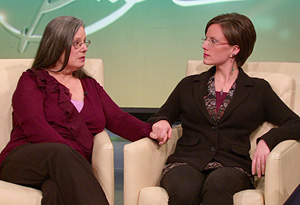
As more and more time passed, Sarah says she had to come to terms with her reality: living in solitary confinement in a room that was only eight by five steps big. After two months of investigation, Sarah's Iranian investigator came to her with some startling news.
"He said, 'You know, I could continue asking you questions, but we've been told that the investigation is finished, and at this point, it's become political,'" Sarah says. "I said, 'What does that mean it's become political?' He just said: 'Well, I just mean it's become political and it really doesn't matter if you're innocent or not. This is bigger than you.' And it just hit me that I was part of something much bigger than myself—something that I didn't deserve to be a part of, but I was a part of it."
Even though solitary confinement was unbearable at times, Sarah says it was even more difficult to think of her mother back home. After seven months of begging the guards to let her call home, Sarah was finally allowed to phone her mother.
"It was incredible just to know she could have that relief," Sarah says. "It was also really difficult because I felt I didn't have a lot of hope at that time, and I heard her—that hope in her voice—and I was happy she had hope. But I didn't have hope."
"He said, 'You know, I could continue asking you questions, but we've been told that the investigation is finished, and at this point, it's become political,'" Sarah says. "I said, 'What does that mean it's become political?' He just said: 'Well, I just mean it's become political and it really doesn't matter if you're innocent or not. This is bigger than you.' And it just hit me that I was part of something much bigger than myself—something that I didn't deserve to be a part of, but I was a part of it."
Even though solitary confinement was unbearable at times, Sarah says it was even more difficult to think of her mother back home. After seven months of begging the guards to let her call home, Sarah was finally allowed to phone her mother.
"It was incredible just to know she could have that relief," Sarah says. "It was also really difficult because I felt I didn't have a lot of hope at that time, and I heard her—that hope in her voice—and I was happy she had hope. But I didn't have hope."
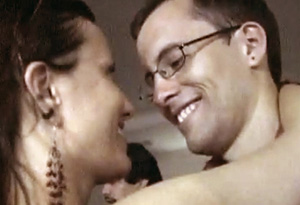
Nine months into their ordeal, Shane and Sarah experienced one big moment of joy: They got engaged. "That was a special moment," Sarah says. "That was one of the best."
At that point, they were only seeing each other for an hour a day in a small outdoor court. Sarah says she, Shane and Josh would spend that hour in a circle, holding hands and comforting one another. They even tried to perk themselves up on Fridays by "dressing up."
"The only way I could make myself look a little better was [by putting] some strawberry jelly on my lips," Sarah says. "Of course I didn't have a mirror, so I had no idea what I looked like in prison."
Sarah says her time in prison changed the way she looked at life and showed her what's really important: her family and her relationship with God. She says it was the thought of her loved ones back home that helped her to keep up hope.
"There was only one day in prison that I really gave up—that I just didn't get out of bed, didn't eat. I just cried," she says. "I had to pick myself up because I had to keep going for my mom and for everyone else that loves me."
At that point, they were only seeing each other for an hour a day in a small outdoor court. Sarah says she, Shane and Josh would spend that hour in a circle, holding hands and comforting one another. They even tried to perk themselves up on Fridays by "dressing up."
"The only way I could make myself look a little better was [by putting] some strawberry jelly on my lips," Sarah says. "Of course I didn't have a mirror, so I had no idea what I looked like in prison."
Sarah says her time in prison changed the way she looked at life and showed her what's really important: her family and her relationship with God. She says it was the thought of her loved ones back home that helped her to keep up hope.
"There was only one day in prison that I really gave up—that I just didn't get out of bed, didn't eat. I just cried," she says. "I had to pick myself up because I had to keep going for my mom and for everyone else that loves me."
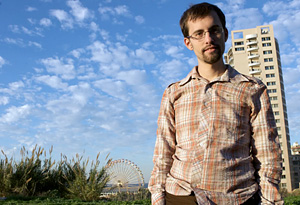
Sarah says that as long as Shane and Josh are still imprisoned, she is only one-third free.
Shane's mother, Cindy, says she hasn't gotten any information about her son's future. "We have not heard anything beyond Sarah's release. We really don't know if there's going to be a trial, when there's going to be a trial, so we're really in the dark," Cindy says.
Shane's mother, Cindy, says she hasn't gotten any information about her son's future. "We have not heard anything beyond Sarah's release. We really don't know if there's going to be a trial, when there's going to be a trial, so we're really in the dark," Cindy says.
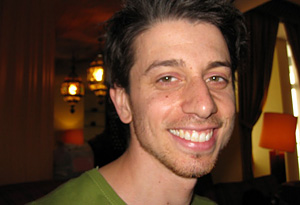
Josh's mother, Laura, says she saw her son on May 21, 2010, but hasn't had any contact with him since. "I write to Josh every day. I write to him what I do. I give him hope," she says. "I ask questions that I know will not get answered. I tell him things that I think would make him energized and happy and realize he's coming home to a nest and a family that can't wait to grab him and hug him."
To help bring Shane and Josh home, Sarah, Cindy and Laura urge people everywhere to do what they can, including writing to Iranian authorities and reaching out to the U.S. government. "We really need the support of not only people in the United States but people all over the world," Cindy says. For more information on how to help, visit FreetheHikers.org.
To help bring Shane and Josh home, Sarah, Cindy and Laura urge people everywhere to do what they can, including writing to Iranian authorities and reaching out to the U.S. government. "We really need the support of not only people in the United States but people all over the world," Cindy says. For more information on how to help, visit FreetheHikers.org.

Photo: Getty Images
Just recently, ABC's Christiane Amanpour sat down with the president of Iran, Mahmoud Ahmadinejad, and asked about Shane and Josh's release.
Christiane: The United States is very pleased you have released Sarah Shane and the secretary of state, Hillary Clinton, has said that she wants the other two, Josh and Shane, to be released also, a humanitarian gesture.
President Ahmadinejad: Now you may be aware that eight Iranians are illegally being detained in the United States. So I believe that it would not be misplaced to as that the U.S. government should make a humanitarian gesture to release Iranians who were illegally arrested and detained here in the United States.
We're saddened that there are individuals in prison, and it make us unhappy when people are in prison anywhere in the world. But in the end of the day, there's a law that determines who stays in prison and who does not.
Christiane: And do you think they'll be released anytime soon? Would you intervene like you did for Sarah?
President Ahmadinejad: I would give a recommendation, but their cases have to be examined. They violated the law.
Christiane: The United States is very pleased you have released Sarah Shane and the secretary of state, Hillary Clinton, has said that she wants the other two, Josh and Shane, to be released also, a humanitarian gesture.
President Ahmadinejad: Now you may be aware that eight Iranians are illegally being detained in the United States. So I believe that it would not be misplaced to as that the U.S. government should make a humanitarian gesture to release Iranians who were illegally arrested and detained here in the United States.
We're saddened that there are individuals in prison, and it make us unhappy when people are in prison anywhere in the world. But in the end of the day, there's a law that determines who stays in prison and who does not.
Christiane: And do you think they'll be released anytime soon? Would you intervene like you did for Sarah?
President Ahmadinejad: I would give a recommendation, but their cases have to be examined. They violated the law.



